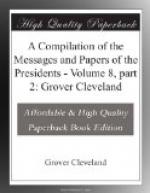In proclaiming and adhering to the doctrine of neutrality and nonintervention, the United States have not followed the lead of other civilized nations; they have taken the lead themselves and have been followed by others. This was admitted by one of the most eminent of modern British statesmen, who said in Parliament, while a minister of the Crown, “that if he wished for a guide in a system of neutrality he should take that laid down by America in the days of Washington and the secretaryship of Jefferson;” and we see, in fact, that the act of Congress of 1818 was followed the succeeding year by an act of the Parliament of England substantially the same in its general provisions. Up to that time there had been no similar law in England, except certain highly penal statutes passed in the reign of George II, prohibiting English subjects from enlisting in foreign service, the avowed object of which statutes was that foreign armies, raised for the purpose of restoring the house of Stuart to the throne, should not be strengthened by recruits from England herself.
All must see that difficulties may arise in carrying the laws referred to into execution in a country now having 3,000 or 4,000 miles of seacoast, with an infinite number of ports and harbors and small inlets, from some of which unlawful expeditions may suddenly set forth, without the knowledge of Government, against the possessions of foreign states.
“Friendly relations with all, but entangling alliances with none,” has long been a maxim with us. Our true mission is not to propagate our opinions or impose upon other countries our form of government by artifice or force, but to teach by example and show by our success, moderation, and justice the blessings of self-government and the advantages of free institutions. Let every people choose for itself and make and alter its political institutions to suit its own condition and convenience. But while we avow and maintain this neutral policy ourselves, we are anxious to see the same forbearance on the part of other nations whose forms of government are different from our own. The deep interest which we feel in the spread of liberal principles and the establishment of free governments and the sympathy with which we witness every struggle against oppression forbid that we should be indifferent to a case in which the strong arm of a foreign power is invoked to stifle public sentiment and repress the spirit of freedom in any country.
The Governments of Great Britain and France have issued orders to their naval commanders on the West India station to prevent, by force if necessary, the landing of adventurers from any nation on the island of Cuba with hostile intent. The copy of a memorandum of a conversation on this subject between the charge d’affaires of Her Britannic Majesty and the Acting Secretary of State and of a subsequent note of the former to the Department of State are herewith submitted, together with a copy of a note of the Acting




